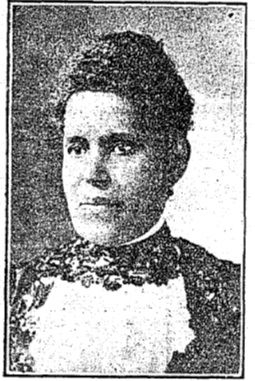Mary Frisby Handy
(1848-1932) Baltimore, Maryland
Mary Frisby Handy, a suffragist, missionary, and once leading member of the Black Women’s Club movement was born in Baltimore, Maryland in 1848. She was one of 13 children. At age 17, Mary lost her mother and decided to leave Baltimore to go to Newark, New Jersey to become a tailor. Later in life, Mary decided to move to Philadelphia, Pennsylvania. While in Philadelphia, Mary met and married Dr. S. Clark Frisby. Six years into their marriage Dr. Frisby died, leaving Mary a widow.
Four years after the death of Dr. Frisby, Mary married Bishop James A. Handy, a bishop in the African Methodist Episcopal (AME) Church. In 1906, Mary became the president of the Women’s Parent Mite Missionary Society (WMS) of the AME Church because of her dedication and hard work to the organization. A month before Mary’s 25th wedding anniversary in 1911, her husband passed away. After the death of Bishop Handy, Mary became known as “Mrs. Bishop Handy” and assumed a leadership role as an assistant pastor, committing herself to serve the congregation and her community.
As President of the WMS and a member of the Women's Cooperative Civic League Organization, Mary used her position to start a discussion of women's suffrage. In one of her meetings in 1915, she led her federation to endorse women’s suffrage going on record in 1916 as “Favoring Women Suffrage.” In that same year, Handy aided in the organization of the Women's Suffrage Convention that involved presentations from representatives from the states where women could vote. In 1920 Mary made sure that all female residents in the AME home were taken to the polls to cast their votes.
It was said by many who knew Mary to be a very kind woman who in “charitable deeds never lets her left hand know what the right hand has done, a woman of high moral standing, of the strictest integrity, and thoroughly alive to every opportunity.”
Handy lived up to the age of 84 and died in 1932 after suffering from a stroke and a brief period of paralysis. Although many other great women have also passed on, her work and contribution to women's suffrage continues to live on.
Why I Chose This Person
"I am Richard Arthur Quansah and I chose Mary Frisby Handy because I was inspired by her relentless commitment in serving her community and aiding in the cause of women's suffrage regardless of the loss of her first and second husband. I believe many would question God and want to give up after the deaths of both husbands, but she was persistent in the fight for her cause and decided to contribute to her community."

Learn More
Did you know the Women's Mite Missionary Society (WMS) was founded in 1847 to initially give humanitarian assistance in Haiti? So many women in the AME church desired to do their part that a formal society was created and now operating all over the world. The Smithsonian recently transcribed all the minutes from the Baltimore Branch of the WMS. Check out the digitized and transcribed minutes from the Women’s Mite Missionary Society! available here
Works Cited
Valeriann, Christine R. Biographical Sketch of Mary Frisby Handy. Alexandria: Alexander Street, 2020. Alexander Street database. Alexander Street. available here

